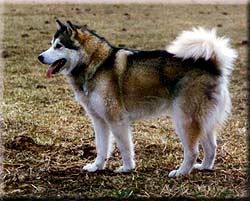
Wildside
Endangered Species & Wild Animals
All content © by Diana L. Guerrero unless otherwise noted and may not be reprinted without prior written permission. All rights reserved. Click here for reprint permissions and fees.
Wildside Explores Wolf Dogs (Canine Hybrids)
Interested in canine hybrids, considering obtaining one, or already entrenched in ownership of an animal that is too complicated for your lifestyle? This article will touch on different issues surrounding wolf dogs also known as wolf dog hybrids. There are seven parts to this comprehensive wolf dog series click here to start at the beginning.
Canine
Hybrids: (Part 2 of 8)
Issues Surrounding The Wolf Dog
Photos Copyright © By Monty Sloan & Jill Moore Porter.
Wolf Dog Hybrid Identification
Can you tell if your animal really is a hybrid? Maybe and maybe not! You can look at physical traits, behavior, and the parents but there is not a reliable test that reveals it clearly.
This is because there is a lot of variation in the appearance of wolf dog hybrids. The traits exhibited depend on what genes are dominant. Offspring within the same litter can exhibit a wide variety of differences in both temperament and physical attributes.
The more traditional dogs crossed with the wolf to obtain the hybrid include Alaskan malamutes, Siberian huskies, German shepherds, Belgium tervuerens, samoyeds, akitas, and a vast number of others. In addition, there have recently been inadvisable crosses with pit bulls, doberman pinschers, rottweilers, and chow chows. These crosses exhibit some of the undesirable physical or temperament traits.
When the dog and wolf are first crossed to produce a hybrid, the offspring will usually exhibit "hybrid vigor." This generally means that they are usually larger than normal. This can be apparent in many generations, but seems to be more drastic in the first generation of animals.
Many of the wolves I have been around weigh an average of 70 pounds; a hybrid may tip the scales at much more. I have seen hybrids weighing 120 to 150 pounds. They inherit some of the vigor of the wolf and are more energetic and extremely strong in comparison to an average dog.
Beware of anyone who claims the percentages of "wolf" in their hybrids since it cannot be determined accurately what traits or genetic materials will be exhibited. The first cross of wolf to dog has a 50%-50% contribution from each parent, but what is inherited and exhibited can vary greatly even within the same litter.
Any creature with claws and teeth has to be monitored by the owner; it doesn't matter if it is wild or domestic. The perpetuation that the wolf dog hybrid is a good pet comes from not only irresponsible breeders, but from those who claim that their animal has wolf blood in it when it doesn't.
  |
Can you identify which one of these animals is a wolf dog? Place your mouse each one to find the answer! |
Two wolf dog specialists, Monty Sloan and Nicole Wilde, are involved in wolf dog rescue and successful integration into homes. They are not financially motivated by the sale of these animals and provide good wolf dog educational resources that discuss the topic of percentages. They explain,
"It has been estimated that over 90% of wolf hybrids sold in this country are credited with being of higher wolf content than they actually are." 4
And
"It can be said that the majority of wolf hybrids are misrepresented as to the amount of wolf in the animal. Although an accurate survey of this would be difficult to make, perhaps impossible, general experiences of most individuals working with hybrids all come to a similar conclusion -- that somewhere on the order of 75% - 90% of wolf hybrids have a lower wolf content than is claimed by the owner."5
In my experience I find this to be true. It is also fortunate that most people that I have encountered are absorbed with the idea of having a hybrid and actually purchase a mutt rather than a true wolf dog hybrid. This happens often since many people do not even know the breed differences between the popular dog breeds. What makes this dangerous is that they also spread the word that "wolf dogs make good pets."
Pet owners seem to make these declarations because it creates more interest in their animal, gives them an ego boost and feeds their fantasy. Those that I encounter who claim that their mutt has "wolf" blood have no clue to the parentage or breeding background when asked. This type of irresponsible behavior only adds to the delusion that wolf dogs make good pets; they usually don't.
There are some successfully integrated wolf dogs out there. They are in proper facilities, homes and lifestyles that can accommodate them. However, if you worked in the behavior, sheltering or rescue of these animals you would hear different stories: horror stories, heartbreaking tales and narratives you can't believe are true.
Once you are dealing with breeding animals of mixed heritage there isn't any real way to tell what traits will be passed on to the offspring. Some animals will look more wolfish, while others may exhibit more dog-like features. The extremes of behavior and temperament can be just as variable.
The "Lobo Look" is what most buyers crave. Wolves tend to be longer and lankier in build and have a thicker coat (guard hairs and undercoat) especially around the neck and shoulder areas. They have narrower and longer muzzles, larger teeth with a slight curve in their canines. They usually lack an indent on the brow, have straight tails, longer and larger paws, and have fur on the interior of their ears, which are erect and fairly small in proportion to their head. Eye color can be amber, gold, or darker and many look like they have eyeliner around their eyes.
The attraction to wolf dogs also comes from the mistaken belief that wolf dogs will make better guard or protection animals. However the reality is that wolves tend to be flighty around humans. They can also exhibit more predatory behavior toward children and other animals. These are undesirable traits in a pet!
Wolf Dog Hybrids Part Three: Wolf Dog Hybrid Ownership Issues
Diana L. Guerrero, author of this series, is an animal behavior consultant and animal training coach with extensive experience in many areas of the animal world. She first began working with wolf-dogs in 1979 and discourages the ownership and breeding of these animals.




